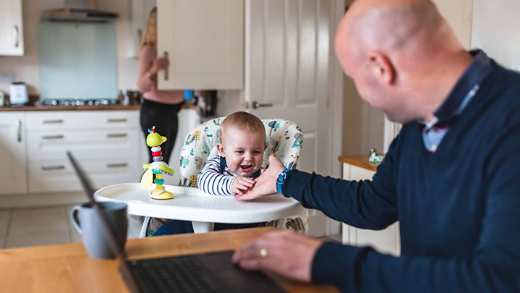First off, what exactly is income protection insurance?
If you have income protection insurance, you could get money every month to help cover your outgoings if you’re unable to work because you’re ill or injured.
It’s meant to replace some of your lost earnings, helping you pay essential bills like your rent or mortgage, childcare bills, or your phone contract. It also means you and any loved ones can carry on living life as normally as possible.
And income protection insurance isn’t just about the money – you’ll also get support such as access to rehabilitation services to help you bounce back and start earning again.
So, do you need income protection insurance?
Ask yourself a few questions about what would happen if you got sick or injured and couldn’t work.
Think about your circumstances and ask yourself what it would take for you and your family or loved ones to get by financially if your income dried up.
If you’re an employee, you should be eligible for statutory sick pay, and your employer may top this up with company sick pay. But most companies will only pay this for a certain amount of time. So, what happens afterwards?
And if you’re self-employed, you can enjoy the sweet perk of being your own boss, but you don’t get traditional employee benefits like company sick pay.
If you can’t work because you’re sick or injured, you may be eligible for state benefits, but you should consider if these would cover your essential outgoings.
You could also take into account things such as savings and if you could live off the income of a loved one.
If you’re not sure you would have enough money to keep on paying the bills, this is where income protection insurance could help. Giving reassurance for the future that, should the unexpected happen and you get sick or injured, you’ll get a financial helping hand.
If you’re wondering ‘how much income protection insurance do I need?’
It’s time for a bit of number crunching. What are your outgoings each month? Think about the everyday bills you have to pay, such as mortgage or rent, utilities, childcare, phone contracts, car finance or credit card payments. The things you would have to keep on paying even if you couldn’t work.
Remember, income protection isn't designed to cover your full salary. Most policies will cover a proportion of your salary up to a specific limit, while some policies will offer a small guaranteed monthly amount.
The younger you are when you take out an income protection policy, the cheaper it tends to be. That’s because the older you are, the more risk there is of you becoming ill. So, each year, the older you get, the more expensive it is to take out income protection insurance.
If you take out an income protection policy with us, it not only gives reassurance for the future but also gives you help and support to live well today.
That’s because you’ll get access to the Aviva DigiCare+ health and wellbeing smartphone app, at no extra cost, which is provided by Square Health. This serves up a tasty range of tools that could help you eat better, feel better and keep well, including an annual health check, mental health support, and nutritional advice.
Please be aware that the benefits of the app don't form part of your cover, and they could change, or be removed, in the future. This is a non-contractual benefit Aviva can withdraw at any time. Terms and conditions and the privacy policy for Aviva DigiCare+ can be found within the app. Of course, the main reason for taking out a policy with us is financial protection, you shouldn't take out a policy for Aviva DigiCare+ alone.
How income protection insurance works
Income protection insurance gives you a fixed payment each month to help replace some of your lost earnings if you can’t work because of illness or injury. It doesn’t cover you if you’re made redundant or are unemployed.
If you have income protection insurance and make a successful claim, depending on the policy you have, you’ll continue to get monthly payments until you’re able to return to work, for a set amount of time (known as a payment period), or until the policy ends.
Normally, the policy doesn’t end once you've made one successful claim, meaning you can claim again if your illness returns or you develop something new. You can continue to make as many claims as you need to while the policy lasts.
Often when you take out an income protection policy, you can decide how much money you’ll receive if you need to make a claim, how long your policy lasts for and how long the deferred period is. You may not need payments straight away. A deferred period is how long you'll need to wait until you get your first payment after making a successful claim. This can be anything from four to 104 weeks. However, you’d need to check the details of your specific policy to see if there are any limits or restrictions to this.
If you pick a longer deferred period, the amount you pay each month in premiums could be less, but it means you must wait longer to get your first payout. So, to decide what deferred period is right for you, think about long you could wait for your first payment before money got tight.
Make sure you’re in the know
Income protection insurance pays out if you’re unable to work because of illness or injury, but every insurer has their own definition of what this is.
For example, all our income protection policies give you ‘own occupation’, which means we’ll pay out if you can’t do the type of job you have at the point of making a claim.
Other insurers could offer policies with other definitions, but these might come with extra conditions. A ‘suited occupation’ definition means you’ll only receive a payout if you're unable to work in any role that may be suitable based on your skills, qualifications and experience. Other definitions may only cover you if you’re unable to do certain daily activities, such as climbing the stairs without help.
Income protection policies have no cash-in value, and if you stop paying your premiums, your cover stops, and you get nothing back.
















